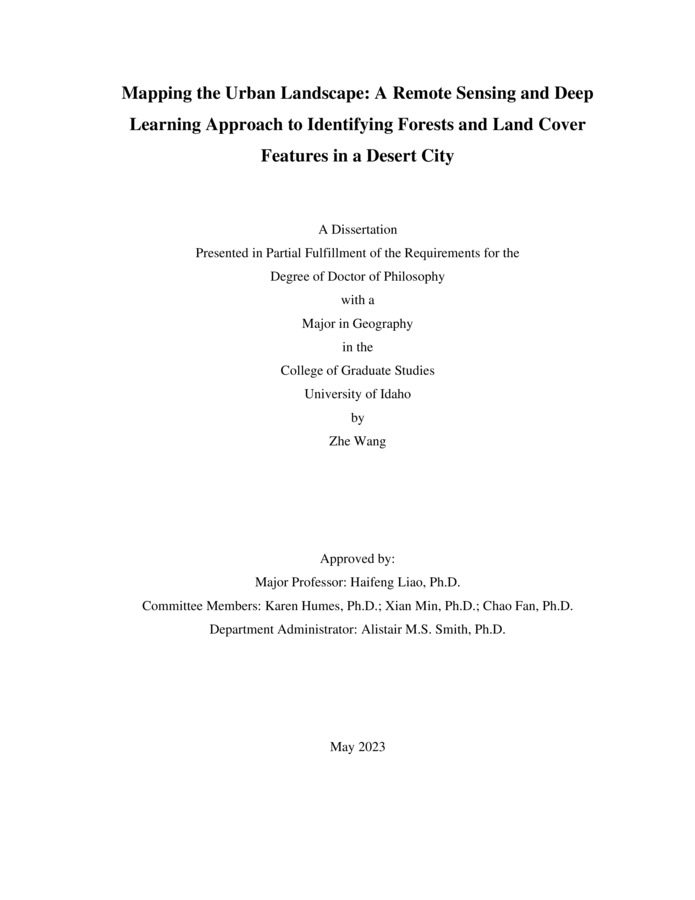Mapping the Urban Landscape: A Remote Sensing and Deep Learning Approach to Identifying Forests and Land Cover Features in a Desert City
Wang, Zhe. (2023-05). Mapping the Urban Landscape: A Remote Sensing and Deep Learning Approach to Identifying Forests and Land Cover Features in a Desert City. Theses and Dissertations Collection, University of Idaho Library Digital Collections. https://www.lib.uidaho.edu/digital/etd/items/wang_idaho_0089e_12615.html
- Title:
- Mapping the Urban Landscape: A Remote Sensing and Deep Learning Approach to Identifying Forests and Land Cover Features in a Desert City
- Author:
- Wang, Zhe
- Date:
- 2023-05
- Embargo Remove Date:
- 2023-12-08
- Keywords:
- Deep learning Remote sensing Transfer learning Urban land cover mapping
- Program:
- Geography & Geological Science
- Subject Category:
- Remote sensing; Computer science
- Abstract:
-
Urban forests are essential components of the urban environment, providing a wide range of benefits to society, such as air pollution reduction, carbon sequestration, and improved mental health. Accurately mapping and monitoring urban forests is crucial for better urban forest management and planning. In this dissertation, I explore the application of deep learning techniques to extract urban tree canopies and classify land cover features in urban areas. Specifically, Chapter 2 investigates the effectiveness of the U-net in urban tree canopy mapping using high-resolution aerial photos. Our results show that the U-net can achieve exceptional accuracy scores in fine-scale land cover mapping and outperforms other widely used methods. However, the lack of publicly available training datasets and very high-resolution data remains a challenge for scaling up the U-net to large areas. Based on the findings in Chapter 2, I proposed a cross-scale transfer learning framework that utilizes pre-trained models at various scales to classify land cover features in Phoenix, Arizona. The results demonstrate that our framework achieves high accuracy in classifying impervious surfaces, buildings, low vegetation, and tree classes, outperforming other commonly used methods. Moreover, the robustness and feasibility of our proposed framework are evaluated by testing it over time and in different geographic areas, demonstrating its generalization ability. Overall, our study highlights the potential of deep learning techniques and transfer learning in improving the accuracy and efficiency of urban land cover classification, particularly in complex urban environments with varying spatial resolutions. In addition to mapping urban forests and land cover, Chapter 4 explores the complex relationships between urban forest characteristics and socio-economic indicators in Phoenix, Arizona, using advanced statistical models. The study finds that minority and low-income populations have limited access to natural amenities, which is consistent with earlier research demonstrating that trees are disproportionately distributed in neighborhoods with low-income or people of color. However, the study also finds that communities with more trees and shrubs are associated with higher educational performance, highlighting the potential positive effects of urban forests on public health and well-being, including educational outcomes. The results of the study suggest that targeted and localized approaches to urban forest management are necessary to promote equitable access to green spaces and improve public health and well-being in diverse metropolitan areas like Phoenix. This dissertation makes significant contributions to the field of land cover mapping and urban remote sensing. The study proposes novel deep learning-based frameworks that utilize transfer learning and multi-scale segmentation techniques to achieve accurate and efficient urban land cover classification. Specifically, the study demonstrates the effectiveness of the U-net architecture for urban tree canopy mapping and the cross-scale transfer learning framework for land cover classification in urban areas. These findings provide valuable insights into the potential of deep learning and transfer learning for improving the accuracy and efficiency of urban land cover mapping, particularly in complex urban environments with varying spatial resolutions. Moreover, the study sheds light on the complex relationships between urban forest characteristics and socio-economic indicators, highlighting the need for targeted and localized approaches to urban forest management to promote equitable access to green spaces and improve public health and well-being in diverse metropolitan areas. Overall, the contributions of this dissertation provide valuable insights into the application of advanced remote sensing and machine learning techniques for urban land cover mapping and management, with potential applications in urban planning, environmental management, and public health research.
- Description:
- doctoral, Ph.D., Geography & Geological Science -- University of Idaho - College of Graduate Studies, 2023-05
- Major Professor:
- Liao, Haifeng
- Committee:
- Humes, Karen; Xian, Min; Fan, Chao; Smith, Alistair
- Defense Date:
- 2023-05
- Identifier:
- Wang_idaho_0089E_12615
- Type:
- Text
- Format Original:
- Format:
- application/pdf
- Rights:
- In Copyright - Educational Use Permitted. For more information, please contact University of Idaho Library Special Collections and Archives Department at libspec@uidaho.edu.
- Standardized Rights:
- http://rightsstatements.org/vocab/InC-EDU/1.0/

